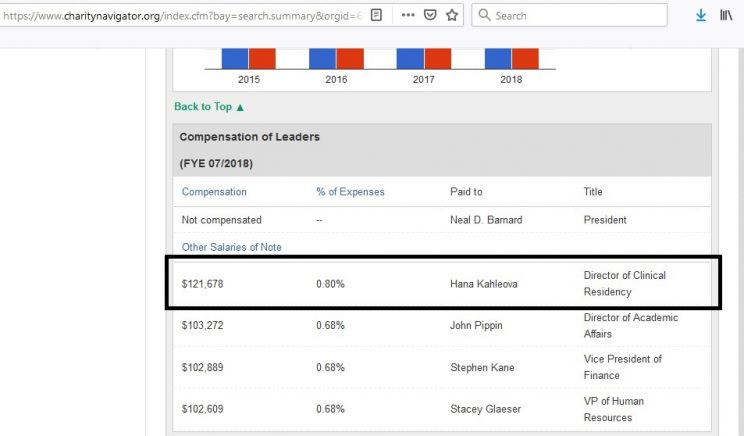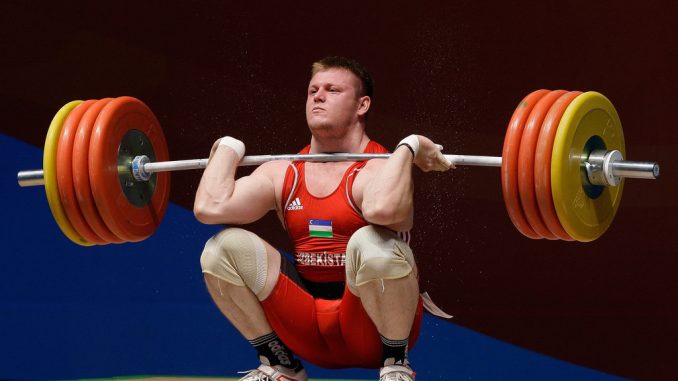
Well folks, it’s finally here: Part II of my review of the crockumentary The Game Changers, a Hollywood-produced propaganda piece designed to fool people into thinking a meat-free diet will somehow make them bigger, leaner, faster, stronger and healthier.
Using slickly-produced footage of “plant-based” athletes, the movie relentlessly tries to convince you veganism will turn you into a world-beating athlete. Vegan diets, we are told, make your blood flow better, give you more energy, improve your recovery after exercise, increase your strength, give you eye-popping muscles and basically turn you into the King of the Goddamn Jungle.
A herbivorous King of the Jungle, that is.
 Be my guest: Tell this guy his carnivorous eating habits are unethical and unhealthy.
Be my guest: Tell this guy his carnivorous eating habits are unethical and unhealthy.
The movie even exploits the “sex sells” angle by making the utterly ridiculous claim that eating vegan burritos will make your dick harder!
Seriously.
In his attempt to “man up” the image of veganism, the movie’s star James Wilks even claims animal foods increase a man’s estrogen levels and lower his testosterone levels! Dropping animal foods and embracing veganism, the movie would have us believe, is the ticket to becoming a hard-ass man’s man!
For a rather unforgiving scientific rebuttal to these absurd claims, read on.
Meat Gives You “Cloudy” Blood and Destroys Your Athletic Performance!
At about 22 minutes into this mockumentary we meet Dr Robert Vogel, who tries to convince us meat consumption turns our blood into sludge and stops our arteries from “opening up.” He describes an experiment in which two Miami Dolphins NFL football players were given a beef burrito breakfast on one day, then a bean burrito breakfast on another day. Another player who was already eating a “plant-based” diet ate the bean burrito both days. In the 2 hours following the meal, the players had blood samples taken. Vogel holds up the vials of the beef and burrito blood samples after they’ve been spun senseless in a centrifuge, and bangs on about how the top (serum) portion of the sample taken after the beef burrito breakfast is more “cloudy.”
Here’s my carefully considered scientific appraisal of this observation:
Y-a-w-n.
I mean, seriously, who ever heard of anyone dying of “cloudy” blood?
“Darlene, did you hear about Neil down the road?”
“No … what happened to him?”
“He died suddenly last night while bonking his mistress!”
“Let me guess … cloudy blood, right?”
“Yup.”
[Synchronized gasps of horror]
As a fat-containing meal is digested, short- and medium-chain fatty acids will appear in your blood stream. So too will long-chain fatty acids, which will be coated with cholesterol and protein into compounds called chylomicrons. This is why the serum from a blood sample taken after a high-fat meal will be “cloudy” when compared to that taken after a low-fat meal.
Take a big, deep breath folks – this is all perfectly normal and healthy. Contrary to what The Game Changers wants you to think, it’s not like used engine oil is suddenly being dumped into your bloodstream.
But according to Vogel, not only could “cloudy” blood send you to an early grave, but in the meantime it will also destroy your athletic endeavours!
“So if you have bacon and eggs for breakfast, a hamburger for lunch and a steak for dinner,” continues the fantasy-based Vogel, “this is going on all day long, your blood is always cloudy.”
Yeah, but so what?
“And the ability to operate at your best is always impaired,” adds Vogel.
“Damn,” says one of the players, unaware that Vogel has no idea what he’s talking about. “I guess I won’t be eating my fried chicken no more.”
Well, you can be damn sure I’ll keep eating my chicken – although I much prefer it lovingly roasted rather than assaulted with heavily refined plant oils at some fast-food trap like Kentucky Fried Gastroenteritis.
 Three Miami Dolphins players after participating in one of the most meaningless experiments of all time.
Three Miami Dolphins players after participating in one of the most meaningless experiments of all time.
If eating meat means your “ability to operate at your best is always impaired,” then it should readily show in controlled experiments comparing the effect of omnivorous and meat-free diets on athletic performance.
Which brings us to one of the key themes of The Game Changers:
Meat-Free Diets are THE SHIT™ for Athletic Performance!
Actually, they’re not.
The Game Changers does all it can to brainwash us into believing a meat-free diet will make us bigger, stronger, fitter and faster.
The folks responsible for this duplicitous movie don’t just rely on slick Hollywood production and cherry-picked athletes to get this impression across: Wilks himself has explicitly stated he thinks meat-free diets are “superior” for athletes. At 2:45 of this video, Wilks again boasts of the “over 1,000 hours” he allegedly spent “looking at peer-reviewed science”, after which he “realized that a plant-based diet, you know, was superior and optimal for, ah, health and athletic performance.”
I can tell you right now that whatever Wilks based this realization on, it sure as heck was not peer-reviewed science. Because I’ve looked at that research, and can tell you it completely fails to show a “plant-based” diet is “superior and optimal” for health and athletic performance. Unlike Wilks et al, who quickly flash screenshots of journal papers in The Game Changers but never discuss their actual contents, I’m happy to share this research with you (in the references section below, I’ve also linked to the free full text of these papers wherever possible).
Let’s start with the clinical trials dealing with the effect of meat-free diets on strength and muscle gain, then the trials examining their effect on aerobic and anaerobic “cardio” activities.
Meat-Free Diets Show No Advantage Whatsoever for Muscle and Strength Gains
A 1999 paper reported on the muscle-building effect of a meat-containing diet compared with a lactoovovegetarian diet. For 12 weeks, 19 men aged 51-69 consumed their habitual omnivorous diets, while another 10 similarly-aged men were counselled to follow the vegetarian diet. The head author of this study was Wayne Campbell, from the Nutrition, Metabolism, and Exercise Laboratory at the University of Arkansas for Medical Sciences.
After 12 weeks of hitting the weights, the meat-eating group experienced a slight reduction in body fat percentage, while the vegetarian group experienced a negligible increase. The meat-eaters gained 1.7 kg of lean mass, while the vegetarian group experienced a 0.8 kg loss. The meat group experienced a slight increase in whole-body density as measured by underwater weighing, while the vegetarian group experienced a slight decrease. In other words, the meat-eaters ended the experiment slightly bigger, harder and leaner, while the vegetarian group ended up a tad smaller and softer.
The omnivores also experienced greater percentage strength gains on 6 of 7 measured exercises, however the differences failed to attain statistical significance[1].
In a subsequent study led by Mark Haub from the Department of Human Nutrition, Kansas State University, 21 men with a mean age of 65 were randomly assigned to a beef-containing diet or to a lactoovovegetarian diet while following a resistance training program for 12 weeks. By the end of the study, bodyweight, fat mass and lean mass had barely changed in either group. Both groups increased their strength on five lower and upper body exercises, but the improvements were similar in both groups[2].
In the third study, Haub teamed up with Campbell and several other University of Arkansas researchers to again compare the effects of a beef-containing diet with a vegetarian diet in weight training men, this time aged between 59 to 78 years. Again, bodyweight, fat mass and lean mass barely changed in either group. Both groups increased their strength on five lower and upper body exercises, but the improvements were similar in both groups. The only statistically significant difference was a greater increase in leg extension strength at week 12 in the vegetarian group. Given both groups experienced near-identical increases in leg press strength, this finding was likely of no practical significance. The largest difference in percentage strength increase was in the beef group for the seated chest press, but the difference was not statistically significant[3]. Bottom line, both groups experienced similar outcomes in body composition and strength gains.
And so we have three trials, 2 of which found no difference in muscle or strength gains and 1 of which observed slightly better results on a meat-containing diet. In that study, the observed difference may have been due to the higher protein intake of the meat group.
At any rate, these studies hardly support The Game Changer's contention that a "plant-based" diet is the man-did-you-see-the-arms-on-that-dude supremo diet for muscle and strength gains.
Meat-Free Diets Fail to Show Any Advantage for Anaerobic and Aerobic Endurance
Okay, so meat-free diets do nothing to improve your muscle and strength gains. But what about endurance performance? Did Scott Jurek become accomplished at ultramarathon running because of his vegan diet, as The Game Changers pretends, or was it because he did lots of ultramarathon running?
Let’s see what the clinical research has to say.
I was able to find four published, peer-reviewed clinical trials examining the effect of meat-free diets on anaerobic and aerobic endurance activities.* Most of these studies measured changes in fitness by way of time-to-exhaustion or sprint tests on cycle ergometers (i.e. specially-equipped stationary bikes).
The earliest of these studies was published in 1992 by Danish researchers. Eight endurance-trained male athletes aged 21-28 spent 6 weeks on the vegetarian diet and 6 weeks on the meat-rich diet, in randomized crossover fashion. The two dietary phases were separated by four weeks in which the athletes consumed their regular diets.
At 0, 3 and 6 weeks on each diet, the subjects underwent aerobic tests, in which the difficulty was increased every 15 minutes until the subjects could no longer maintain the required pace. When the final results were tallied, no differences were noted between the two diets. At week 0, the subjects randomized to the meat-eating group lasted 75 seconds longer than those randomized to the vegetarian group; this exact same difference was still evident at week 6[4].
The next study, by Belgian researchers, involved 20 non-vegetarian males and females with a mean age of 21.5 years, who were physically active but not involved in competitive sport or organized training. They were randomized to either a lactoovovegetarian or mixed diet group, the latter of which consumed meat or fish daily.
Throughout the 5-week study, both groups underwent the same sprint training program 2-3 times per week. At weeks 1 and 6, all subjects underwent a repeated sprint ability test on an ergometer. By week 6, the subjects in both groups had improved their power output during all six sprints, with no difference between the lacotovovegetarian or mixed diet group[5].
In a study by Finnish researchers, 9 healthy, recreationally active men (mean age 23.5 years) were randomized to follow a normal diet and a low-protein vegetarian diet in randomized crossover fashion. Each diet was followed for only four days. Before and after the diets, the men underwent graded exercise tests. The tests culminated in the men cycling to exhaustion at 100% of VO2max. At this intensity, the participants lasted 2.89 minutes on the normal diet compared to 1.81 minutes on the vegetarian diet. However, the difference was not statistically significant[6].
So of three trials examining the effect of a meat-free diet and athletes or recreationally active individuals, none found any benefit for the vegetarian diet.
Another problem with all the studies I’ve discussed above is they ranged in duration from 4 days to 12 weeks, which tells us little about the longer-term effects of these diets. A meat-free diet may not negatively impact performance in such short time frames, but what happens after a few years, when chronic nutrient deficiencies start to manifest? Meat is the richest and in some cases only meaningful source of nutrients critical for energy production and athletic performance, such as beta-alanine, B12, creatine, carnitine, carnosine, CoQ10 and taurine. Study after study has shown that vegetarians and vegans have lower blood and tissue levels of these nutrients when compared to omnivores.
In terms of controlled clinical evidence, science provides little insight on this question. The fourth trial I found extended for six months and involved forty healthy female omnivores, 10 of whom continued their omnivorous diet throughout the 6-month study. The remaining 30 were randomized to follow a vegetarian diet and were further split into 2 groups, one of which received daily placebo pills while the other was supplemented with 1 g of creatine monohydrate and 800 mg of beta-alanine daily.
Before the trial and after 3 and 6 months, the subjects performed an incremental cycling test. However, no exercise program was prescribed to the participants during the study. Hardly surprising then, that at 3 and 6 months, none of the groups experienced any improvement in their VO2max or time to exhaustion during the incremental cycling test[7].
Hmmm, sit on your butt for 6 months and experience no improvement at all in your fitness, even if you take supplements!
Who would’ve thought?
If you’re wondering why I even bothered mentioning this sedentary study, thank Wilks. Because at 3:42 of this video, Wilks tells the audience, “if I had a choice between a plant-based diet and exercise, I would take the plant-based diet.”
If Wilks would prefer to be a sedentary vegan rather than a physically active omnivore, that is entirely his choice and his right. However, I am here to tell you in no uncertain terms that while exercise has been shown beyond doubt to improve fitness, and cohort studies strongly suggest it can improve longevity, a vegan/vegetarian diet has been shown to do no such thing. In fact, in the German (Heidelberg) Vegetarian Study, vegetarians had slightly higher mortality from all-cause mortality (10%). Meanwhile, vegans had a 59% higher mortality risk than being a lactoovovegetarian. And this was despite the fact non-vegetarians in the study were twice as likely to be smokers![8]
While exercise has been shown beyond doubt to improve strength, power, endurance, co-ordination, flexibility and your all-important lung capacity, sitting on your ass avoiding meat has never been shown to do these things. Not even if you take supplements.
When the likes of Dr Robert Vogel tell you eating meat means “the ability to operate at your best is always impaired,” they’re spouting absolute nonsense.
BREAKING NEWS: Eating 800-1,300 Calories of Highly Processed Crap for Breakfast Might Not Be Good For You!
At around 25:50 of the movie, Wilks claims that Vogel’s meaningless ‘experiment’ was “backed up by numerous studies measuring how a single animal-based meal can impair blood flow.” I should point out “cloudy” blood has sweet FA to do with impaired blood vessel function, but let’s humour these jokers for a moment or two.
As proof of the existence of these “numerous” studies, The Game Changers resorts to its usual strategy: Three journal papers are quickly flashed on the screen, to impress upon viewers that Wilks’ comments are indeed based on sound, peer-reviewed science.
Every time you see this happen in The Game Changers, know it is code for: “These studies look very sciency, but we’re not going to actually discuss their results because they don’t really support what we are claiming in this movie.”
And so I hit the pause button, rewind to the screenshot showing the paper titles, then pause it again while I retrieve them on the web. A read of these papers again confirms Wilks’ comments are about as scientific as an episode of Love Island.
In the first of these papers, the subjects’ mean age was 56 and they ate one of two 800-calorie meals after an overnight fast. Which is where we see the first big fat red flag: Eight hundred calories in a single sitting constitutes a huge breakfast for your average, aging, non-athletic male and female!
To put this in perspective, I think most people would agree 3 large whole eggs, 3 medium-large slices of toast, and 10 grams of butter and a black coffee constitutes a generous breakfast for the average non-athlete. Yet the caloric content of the sizable breakfast I just described to you is only 521 calories.
So a generous breakfast of eggs and toast barely busts the 500-calorie barrier, but this study was passing off an 800-calorie bonanza as a typical breakfast. If you’ve ever scoured through a bunch of these ‘endothelial dysfunction’ studies, you’ll notice that gargantuan breakfast meals are par for the course. Evidently, to elicit any statistically significant response, the researchers responsible for these dodgey studies have to shovel a shitload of calories into the test subjects. That might help achieve ‘statistically significant’ results suitable for publication in today’s increasingly tabloid-like journals, but the real-life relevance of these unrealistic studies is extremely questionable.
What’s more, in order to achieve the results they’re after, the researchers also have to use extremely questionable food choices. In the first study, the high fat breakfast was as follows:
110g rice
100g Korean barbecue
20g egg
200ml milk
8g of an unspecified oil
25g mayonnaise
50g vegetable.
Just the thought of eating that pile of slop for breakfast makes me nauseous. The nutritional breakdown of this utterly unappetizing and non-typical breakfast was:
803 calories
54g fat
31g protein
50g carbohydrate
803 calories and 54 grams of fat for breakfast, coming from such dubious sources as mayonnaise and a no doubt heavily refined vegetable oil?
What the heck does this have to do with meat, exactly?
Even then, the low-fat group experienced a significantly higher rise in post-meal blood glucose levels[9]. While no-one has proved that any transient reduction in post-meal “flow-mediated dilatation” causes heart attacks, we do know that elevated blood glucose is a significant and very likely causal risk factor for coronary heart disease. But while the researchers wank on and on about the reduction in postprandial FMD following the gargantuan breakfast of high-fat slop, they have almost nothing to say about the significantly greater rise in blood glucose after the isocaloric low-fat meal.
The second study was even more absurd.
Shame on You, Italy
The next study is a powerful testament to the virally infective nature of Anglo-Western nonsense, and the incredible, world-conquering power of bullshit.
Italy, the once-great region that blessed the world with the Renaissance and gave us people like Michelangelo and Leonardo da Vinci – arguably the most brilliant individual of all time – now has its own legion of ‘scientists’ who perpetuate the idiotic pro-drug, anti-fat, anti-cholesterol bullshit of their Anglo-Western peers.
And so, in 2000, a group of Italian ‘scientists’ from the University of Perugia published their own dubious ‘endothelial dysfunction’ study[10]. In that charade, ten "physically active young men" with an average age of 23 were given a "standardized high-fat" breakfast consisting of:
-Whipping cream
-Liquid chocolate
-Non-fat dry milk
That is a “standardized” Italian breakfast?
Che cazzo? You’re kidding me, right?
But wait, it gets worse.
In their paper, the Italian researchers don't tell us the actual caloric content of the breakfast, but instead write that the "corresponding caloric intake was 700 kcal/m2." What they are citing here is the calorie intake of the subjects per square meter of their body mass, also known as Body Surface Area (BSA). So to work out how many calories the subjects gulped down during this utterly non-standard breakfast, we need to know their mean BSA. But the researchers do a Silvio Berlusconi and don’t share this with us. Well, we could still work out their BSA using the subjects’ mean baseline weight and height data, but the researchers pull yet another Berlusconi Special and don’t share that with us either.
Dodgey bastards.
OK, they’re not making it easy for us, but hey - I’m part Calabrian and therefore it’s in my DNA to not be outwitted by a bunch of shady whitecoats from Central Italy.
So let's assume the subjects averaged 5'9" and 155 pounds, which would be fairly routine measurements for a physically active Italian male in his 20s. Using the most common BSA formulas, this would give us a BSA of 1.85m2.
Which means, at a caloric intake of 700 kcal/m2, the caloric content of the so-called “standardized” breakfast was a monumental 1,295 calories … !
Gesù Cristo, that’s a huge breakfast for a Tour de France rider, let alone an average Italian lad in his twenties!
Yet these 'researchers' had the audacity to write in their conclusion that such a pancreas-popping caloric extravaganza “is not uncommonly served, especially at ‘fast-food’ restaurants.”
Sure. Because all over Italy, physically active young men in their 20s are walking into fast-food restaurants and ordering the 1,295-Calorie Breakfast Special of Whipping Cream, Liquid Chocolate and Non-Fat Dry Milk!
I mean, in a country renown for its rich culinary traditions, nothing says “Italian” more than an idiotically huge serving of dried milk powder, liquid chocolate and whipped cream!
Folks, this is the kind of absolute bullshit that often worms its way through peer review and gets published and passed off as ‘science.’
As for the propagandists who brought us this abhorrent The Game Changers farce, nothing says “Meat Is Bad For You!” like an experiment by shady researchers that did not even involve meat!
What an absolute joke.
Oh, I almost forgot something. While engaged in the incredibly painful experience of observing Italian researchers eagerly trying to out-bullshit their non-Italian peers – and doing a hell of a job of it - I noticed they referenced a study by “Vogel et al.”
Gee, why does that name sound familiar…
 Dr Robert A. Vogel: The "cloudy" blood guy.
Dr Robert A. Vogel: The "cloudy" blood guy.
And so I pull up this study and, sure enough, the lead author is none other than one Robert A Vogel.
The study provides yet another great insight into Vogel’s ‘scientific’ calibre. It was yet another of these farcical 'endothelial dysfunction' studies that prove nothing except that after eating ungodly amounts of calories from high-fat junk foods, your arteries won't open as wide as they normally do for a few hours as your digestive system struggles and asks itself "why in bejesus is this twat suddenly eating so much crap this morning?"
This time, the “high-fat” breakfast consisted of – wait for it - an Egg McMuffin, Sausage McMuffin, 2 hash brown patties, and a non-caffeinated beverage, all courtesy of the McDonald’s Corporation.
Excuse me while I puke.
This big bolus of Mierda de Macca delivered 900 calories and 50 grams of fat.
The isocaloric low-fat meal, meanwhile, consisted of Kellogg’s Frosted Flakes, skimmed milk, and orange juice.
Vogel and his two co-authors made a big hoo-ha about the observation that at 2-4 hours post-breakfast, flow-mediated brachial artery vasoactivity was 6%-7% lower after the McDonalds meal. Whether this observation actually has any practical significance is doubtful when you consider that, during this same time frame actual blood flow, blood pressure and heart rate were near-identical with both meals[11].
You want my advice?
Don’t be the kind of idiot who eats 900-calorie servings of shit from McDonalds or Kelloggs for breakfast.
And, for heaven’s sake, don’t be the kind of idiot who tells people like me to stop eating perfectly healthy fresh meats and free-range eggs based on the meaningless results of utterly stupid studies involving absurd amounts of highly-processed shit.
 Plant-based versus junk-based - how about people instead just eat like sensible human beings? Is that really too much to ask?
Plant-based versus junk-based - how about people instead just eat like sensible human beings? Is that really too much to ask?
The Great Avocado Wank of 2013
Look, I like avocados. They’re plump and green and full of creamy, spreadable goodness - plus they taste great mixed with minced meat dishes.
🙂
I mention this because the third study involved avocadoes and, quite frankly, it was another irrelevant load of crap. This time, eleven male subjects, mean age 25.4 years, ate two different test breakfasts in random order on separate visits consisting of either:
(a) Ground beef patty seasoned with salt, or
(b) Ground beef patty seasoned with salt and 68 grams of avocado.
After the test breakfasts, the subjects had their blood taken and again the researchers examined the hell out of it in the hope of finding something newsworthy. The only thing they could find was "significant vasoconstriction 2 hours following hamburger ingestion, which did not occur when the avocado flesh was ingested together with the burger." However, the difference in vasoconstriction between the hamburger versus hamburger + avocado consumption was "approaching significant difference (p 0.052)," which is another way of saying it failed to reach statistical significance.
The researchers also wrote: "There was a significant increase in the postprandial concentration of triglycerides in blood from participants consuming the burger at hours 2, 3 and 4 ... Addition of avocado did not increase the triglyceride level any further." This is another way of saying that hamburger versus hamburger + avocado consumption produced an identical rise in blood triglycerides.
Everything else was a big yawn. The researchers measured a host of markers for the catch-all syndrome of 'inflammation.’ Serum IL-6 was higher at 4 hours in the burger group compared to the burger + avocado group, but otherwise similar at all other time points. NFkB activation in peripheral blood mononuclear cells was higher in the hamburger group, but again only reached statistical significance at a single time point, 3 hours post-meal. Serum TNF-α levels were similar in both groups throughout the experiment, with no difference at any time point[12].
This study was a hodge-podge of largely non-significant results, which tell us little of any practical value. But let us, for a moment, pretend the scarce and piddling differences noted in this study do actually indicate that a meal of hamburger and avocado is superior to a meal of hamburger only.
The big earth-shattering revelation from this study would then be that a breakfast meal of meat and plant foods is superior to a breakfast meal comprised of meat only. If this earth-shattering revelation extends to other meals, it would mean that a diet of meat and plant foods is superior to a diet of meat only.
Well bonk me sideways.
Who would ever have guessed that an omnivorous diet is the best option for an omnivorous species like humans?
I mean, apart from your usual hardcore ketogenic zealots, is there anyone who really believes a diet of nothing but meat is best for Homo sapiens?
The other thing I notice when I examine this study is that it involved Hass avocados and the study “was supported by the Hass Avocado Board.” I had to learn that by reading the paper for myself, right to the very end. The Game Changers, you see, despite piously banging on about alleged conflicts of interest in pro-meat research, made absolutely no mention of this. It’s the same old shamelessly biased and hypocritical bullshit you see among ideologues of all stripes: Conflict of interest is an unforgivable evil when occurring in the ‘enemy’ camp, but absolutely wholesome and A-OK when occurring in their own camp!
The Game Changers also made absolutely no mention of the numerous other blatant financial and ideological conflicts of interest inherent in the film. But I will. Here’s a sampling from a very quick internet search - I suspect I could uncover more if I really got my Columbo on.
James Cameron and Suzy Amis Cameron, Executive Producers – this husband and wife team own Verdient Foods, which in 2018 announced it was investing a hefty $140 million to expand into a range of plant-based proteins. A year later, their film The Game Changers is released. Needless to say, if everyone did a Patrik Baboumian and dropped meat and whey protein in favour of plant protein powders, it would financially benefit the Camerons very, very handsomely.
Chris Paul, Executive Producer – investor in Beyond Meat, a company that manufactures ‘fake meat’ by synthesizing it chemically from plant-based materials. Again, if the world succumbs to the kind of pro-vegan propaganda perpetuated by his movie, Paul stands to reap the financial rewards.
Dr James Loomis – introduced in the film simply as a former team physician for the St Louis Rams/Cardinals. No mention is made that he is a "plant-based" doctor at the Barnard Medical Center, which is named after his psychiatrist buddy Neal Barnard and run by the latter’s extremist organization Physicians Committee for Responsible Medicine. Long masquerading as a committee of physicians, Newsweek reported back in 2004 that only 5% of PCRM members were in fact doctors. As ActivistFacts.org notes, “The Physicians Committee for Responsible Medicine (PCRM) is a wolf in sheep’s clothing. PCRM is a fanatical animal rights group that seeks to remove eggs, milk, meat, and seafood from the American diet, and to eliminate the use of animals in scientific research. Despite its operational and financial ties to other animal activist groups and its close relationship with violent zealots, PCRM has successfully duped the media and much of the general public into believing that its pronouncements about the superiority of vegetarian-only diets represent the opinion of the medical community.”
Dr Robert Vogel – introduced in the movie as co-chair of the NFL’s Subcomittee on Cardiovascular Health. No mention is made that he is also a vegan ideologue. He is a former chief medical director of the Pritikin Center and co-author of The Pritikin Edge. For those of you too young to remember, the late Nathan Pritikin was an anti-fat fanatic whose Pritikin Program was all the rage during the 1980s. Flourescent clothes, boofy hairdos and androgynous pop stars were also really popular during the 1980s, so be real careful before blindly emulating trends from that decade.
Dr Dean Ornish – introduced in the movie simply as “founder, Preventive Medicine Research Institute.” In reality, Ornish is a staunch and long-time anti-meat propagandist who has authored a number of vegetarian diet books, his most recent being UnDo It! (Ballantine Books, 2019). While banging on about the evils of the meat- and sugar-rich Standard American Diet, Ornish is more than happy to take lucrative 'consulting' fees from some of its most iconic symbols, including McDonalds, PepsiCo and ConAgra Foods. In an attempt to justify the highly incongruent nature of his consulting activities, Ornish told the New York Times, "It's an amazing platform to make a difference."
Yeah - to his bank account. As for improving America's health by teaming up with junk food and soft drink companies ... gimme a break.
Dr Caldwell Esselstyn – introduced in the movie as “Director, Heart Disease Reversal Program, Cleveland Clinic.” No mention that he is also a vegan ideologue, author of “plant-based” diet book Prevent and Reverse Heart Disease (Avery, 2008) and a member of the advisory board of Naked Food Magazine, for which he also regularly contributes articles espousing a vegan diet.
Rip Esselstyn - introduced simply as Caldwell Esselstyn's son. In reality, he is a vegan activist and author of numerous “plant-based” diet books: The Engine 2 Diet, Plant-Strong (previously published as My Beef With Meat), The Engine 2 Seven-Day Rescue Diet and The Engine 2 Cookbook.
Dr Aaron Spitz – introduced in the movie as “Lead Delegate, American Urological Association.” The movie does mention that Spitz is author of – wait for it – The Penis Book. But no mention is made of the fact that the book recommends a “plant-based” diet for penile health.
Seriously.
I guess this would be an appropriate time to discuss yet another especially ludicrous claim made in The Game Changers …
A Vegan Diet Turns Your Little Pickle Into a Bulging Zucchini!
Sex sells. It’s one of the most time-honoured maxims in advertising, and the PR experts responsible for The Game Changers aren’t about to ignore it. Not everyone cares to be a lean mean fighting machine, but who in their right mind doesn’t want to be a lean mean sex machine?
So in order to exploit the sex angle, at around 52 minutes in, The Game Changers gets kinda creepy. Wilks tells us he rounded up three collegiate athletes and asked Spitz – author of The Penis Book – to conduct an experiment involving their willies. Upon meeting the athletes, Spitz pulls out a model penis and places it on the desk in front of the athletes. He then grabs two rings attached to a cord and places them on the model penis, which is starting to look a lot like an electrically-powered sex toy. The athletes, quite rightly, start looking concerned.
 Dr. Aaron Spitz and his model pee-pee.
Dr. Aaron Spitz and his model pee-pee.
What followed was a two-night experiment organized by Spitz. We are told the athletes were fed burritos containing “grass-fed, organic” beef, chicken and pork on night one, while on night two they were given similar burritos but with “plant-based protein.” Before going to bed on each of these nights, the athletes were each fitted with a device that monitored night-time boners.
This device allegedly printed out how many erections the guys had while asleep, how long they lasted, and how “firm” they were. When the results were in, Spitz told the giggling lads that after eating the plant-based burrito, they spent 300-500% more sleep time with their soldier boys standing erect.
"Now, this is not a scientifically validated study,” admitted Spitz in a huge understatement. “But the results that we're seeing are very exciting ... I think it's going to wake up people who have penises, and I think it's going to wake up people who like people who have penises.”
I need to say a couple of things here:
- I sincerely hope I never meet Dr Aaron Spitz. The guy is flat out weird.
- I have a penis, and I am already awake, despite now being 56 minutes into this mind-numbing farce. And as a fully alert penis owner, I can tell you this study is complete and utter bullshit.
Remember how Spitz said this study was not scientifically validated? It never will be, because the way it was conducted was a biased joke.
For starters, there was no acclimation or control night. I don’t know about you, but if someone like Spitz asked me to attach an electronic device to my chorizo, as a non-creepy guy I’d be pretty bloody nervous about what was transpiring. In properly-conducted experiments where subjects are administered unfamiliar tests, it is par for the course to expose them to a ‘control’ test to get them used to the procedure. This helps ensure any changes noted in subsequent tests are real and not merely an artefact of familiarization.
But Spitz doesn’t do this. Instead, he administers the first – and unfamiliar – test the same night the guys eat the meat-containing burritos. So all three guys go to bed that night with an unfamiliar device attached to their dicks.
The great irony about penises is that, despite their phallic status as symbols of masculinity and virility, they’re actually quite sensitive and vulnerable. There’s a reason groin shots aren’t allowed in boxing and MMA: They freakin' hurt, and they can stop even the toughest guy in his tracks. As a result, guys tend to get a little anxious when potentially dangerous objects come into the vicinity of their whizzers.
So here we have Spitz, strapping a strange device with electrical currents to the athletes’ doo-dads. As the owner of a penis, I think it’s very likely these fellow penis owners went to bed that night feeling a wee bit anxious and awkward. I think it’s also very likely that when they got up the next morning, they were quite relieved to discover their dicks had not been scorched or electrocuted.
As a result, when they went to bed the second night with this now-familiar device attached to their ding-dongs, they would have been in a more relaxed state. This is important, because stress and anxiety are to erections what water is to fire. Or what governments are to freedom. Or what Australian education is to intelligence and literacy skills.
So Spitz has designed this experiment in a way that will virtually guarantee more boners on night 2. He just happens to schedule the plant-based meal to be eaten on night 2 also. He and Wilks could easily have recruited an even number of subjects and had them eat the different meals in random order, but they didn’t do this, because it would have produced results not so film-worthy.
As proof that a vegan diet will make your dick harder, this ‘study’ is a soft, droopy, flaccid load of bollocks.
Vegan Diets Raise Testosterone! Um, No They Don’t…
It seems male vegan activists have a bit of a complex about how their masculinity is perceived by the general public. They apparently believe the rest of us think they’re a bunch of effeminate wusses (I don’t; I just think they’re nuts). The Game Changers even features a scene from a movie in which Sylvester Stallone’s character punches Arnold Schwarzenegger’s character in the face, to which the latter replies, “you hit like a vegetarian.”
So to further convince male viewers that a vegan diet will turn them into a Manly Man With a Big Shwinging Dick™, the creepy Doctor Dick segment is followed by some propaganda about testosterone. We meet vegan bodybuilder Nimai Delgado, who boasts that he has never eaten a piece of meat in his life, and has never had an issue with his testosterone. He says he has had blood tests and they show his testosterone is right where it needs to be and that he clearly doesn’t have any trouble building muscle.
It should be pointed out that Delgado is an IFBB professional bodybuilder. IFBB pros are experts in making sure their testosterone levels are “right where they need to be” for building muscle, if you get my drift.
Nudge, nudge, wink, wink.
Okay, let’s cut the bullshit. IFBB pros are the biggest ‘roid users on the planet, and The Game Changers is now citing one as proof vegan diets won’t hurt your testosterone levels.
[Huge face palm]
To be fair to Delgado, he insists in this video that he has never taken steroids. The video is a bit bizarre, because at 2:35 the interviewer first asks, “so how long have you been clean for then?” i.e., how long has Delgado been off steroids? This suggests the interviewer either assumes or otherwise has knowledge that Delgado has previously used steroids. He then quickly adds “Have you ever taken steroids?”, to which Delgado vehemently replies, “no, I’ve never had to.”
I’ve never had to eat cannoli, but you can be sure as hell I did anyway.
Another interesting comment by Delgado in that video is his assertion that, compared to meat-eaters, he is "recovering faster, getting stronger quicker." But as we've already seen, the clinical trial evidence shows dropping meat from your diet does not make you recover faster and get stronger quicker. So whatever is giving Delgado his self-proclaimed recovery and strength advantage over meat eaters, it sure as hell ain't lettuce and lentils.
Delgado also admits in that video that the IFBB doesn’t drug test. So if he is taking steroids, we have no way of knowing. Interestingly, the very wealthy people who funded and directed The Game Changers could easily have stumped up for independent drug tests to be performed on Delgado and all the other athletes who appeared in the film for the sake of veracity, but this clearly did not happen. If the athletes were all drug free, I’m sure they would’ve had no issue with this.
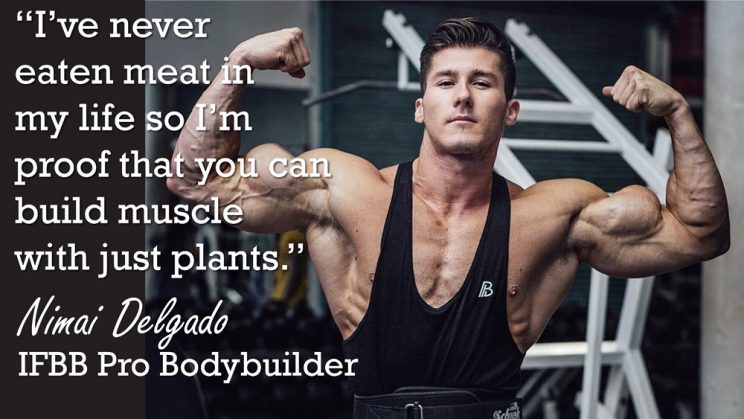 Yeah, but how long have you been clean for? 😉
Yeah, but how long have you been clean for? 😉
Just for the record, under normal circumstances I couldn’t give a rat’s rectum whether or not someone takes the gear. As far as I’m concerned, that’s their business. However, when that person is being proudly paraded by vegan propagandists as an example of what “natural, plant-based” eating can achieve, I think it’s only fair to call bullshit. I hardly call taking synthetic analogues of hormones present in animals and humans – who are clothed animals, not plants - a “plant-based” endeavour!
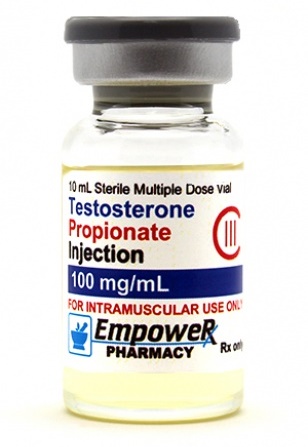 Not sure how this stuff qualifies as “plant-based”…
Not sure how this stuff qualifies as “plant-based”…
More Screenshots
After Delgado is finished flexing his, um, ‘plant-based’ muscles, Wilks shows us some more quick screenshots of studies and makes the following claim:
“Studies comparing men who eat animal foods with those who don’t have consistently demonstrated no difference in testosterone levels.”
Well, by now we all know what that means.
Because vegan diets offer limited sources of complete proteins, vegan athletes often rely heavily on soy-based products and powders to keep their protein intakes up. Wilks, therefore, feels compelled to launch into a defence of soy, claiming the phytoestrogens it contains lower bodily estrogen!
Jesus.
He further claims that it is animal foods that contain actual estrogens, and cites a single study that showed milk consumption in men increased estrogen levels by 26% in one hour, and lowered testosterone by 18%. The study he’s talking about was conducted by Japanese researchers and published in 2010, and only measured hormone levels in the four hours after milk consumption[13]. To my knowledge, the Japanese findings have not been replicated by other researchers. In fact, a 2015 paper reported that when male judo competitors drank 1L of fat-rich, chocolate-flavoured milk immediately after their 5 weekly training sessions, they enjoyed stable testosterone levels and an improved testosterone:cortisol ratio compared to when they drank a water control beverage[14]. When consuming the milk beverage, the fighters also enjoyed superior mood and performance improvements.
Considering Wilks’ fighting background, you’d think this study would have been of special interest to him but, as per the rest of the movie, he ignores it and only cites the Japanese study which happens to support his vegan ideology.
And Wilks’ claim that vegetarian men “consistently” display identical testosterone levels to their omnivorous peers and that soy lowers estrogen levels?
A 1985 paper reported that vegetarian men showed significantly lower testosterone levels than their fellow omnivores. Wilks et al’s usual strategy of fobbing conflicting research off as the product of biased pro-meat researchers won’t work in this case because this study was conducted by Seventh-day Adventist researchers from Loma Linda University, whose religion preaches vegetarianism[15].
A 1990 paper reported on the hormone levels of fifty-one male vegans and fifty-seven omnivores of similar age (mean 40-41 years). In comparison with the omnivores, the vegans had 7% higher total testosterone. Before all the vegan zealots start fist-pumping in victory, they should also know that the vegans had 23% higher levels of sex hormone binding globulin (SHBG), which latches onto free testosterone and prevents it from doing all the good stuff that testosterone does, like building muscle and turning little William into Big Willy when a smoking hot Latina walks by. When SHBG levels are high, the body often produces extra testosterone in an attempt to maintain homeostasis. Despite this, free testosterone still often remains lower than it otherwise would have been. In this case, the vegans had 3% lower free testosterone.
They also had 11% higher levels of estrogen[16]. Maybe their soy milk came from Japanese cows?
Only the SHBG difference reached statistical significance, but these results hardly support the claim that vegetarian diets have no detrimental effect on male hormone levels. Also, the mean age of these guys was around 40 and 63% of the vegans had followed their diet for less than 5 years. There is always the possibility that as these guys got older, the SHBG- and estrogen-raising effect of the vegan diet may have gradually exerted a more pronounced suppression of free testosterone levels.
Also, the paper contains an interesting tidbit about one of the vegan subjects, whose data was excluded from all the statistical analyses because he had a hypogonadal testosterone concentration of only 1.4 nmol/l (the next lowest value was 7.3 nmol/l). He was a 24-year-old vegan of normal weight, but with a high estrogen level. A clue as to how he ended up in his current predicament was a mention in his recruitment questionnaire of formerly drinking 45 pints (26 litres) of beer weekly. Sounds to me like this guy pounded his liver (which can have an effect on estrogen levels) or otherwise altered his hormonal system with his previous heavy drinking. Whatever the cause, it's fair to say his vegan diet was doing little to remedy the problem. Wilks and Spitz want you to think that a vegan diet is the ultimate in testosterone-boosting, dick-hardening nutrition, but it clearly wasn't helping this poor guy.
Again, Wilks et al can’t pass this study off as the product of evil, biased, pro-meat researchers because it was conducted by researchers at Oxford University, home of the Oxford Vegetarians. The head author of this paper, Timothy Key, is a member of the Vegan Society (a vegan/animal rights activist organization) and the UK Vegetarian Society.
In 1989, Canadian researchers reported on their comparison of male vegetarians and omnivores, aged 25-35 years. The vegetarian group again showed higher levels of sex hormone-binding globulin (SHBG) while their free androgen index (a marker for free testosterone) was lower. "Our data," concluded the researchers, "suggest that in a vegetarian group, less testosterone is available for androgenic action."[17] That’s not good, because when there’s a smoking hot Yanet Garcia lookalike lying on your bed beckoning for you to come join her, you need to be ready for androgenic action.
In 2000, Keys published another comparison with three of his Oxford colleagues. Among these was Paul Appleby, a Patron/Lifetime Supporter of the International Vegetarian Union and a member of Oxford Vegetarians who has also served as a local contact for the Vegetarian Society UK in Oxfordshire. Appleby was secretary of the Oxford Vegetarians from 1983 to at least 2002, and writes regular book reviews for the IVU Online News.
The study compared meat-eaters, vegans and vegetarians. In this study, meat-eaters had higher levels of the anabolic hormone IGF-1. However, there were no differences in testosterone, SHBG or free testosterone. A look at the characteristics of the three groups quickly reveals why: The meat-eaters were older and heavier than the other two groups. The mean age of the meat-eaters was 52, compared to 46 in the vegetarian group and only 42 in the vegan group. The researchers claim they “adjusted” these figures for age, BMI and other factors such as smoking, but the “adjustment” charade is, by and large, a complete wank. This is the belief that by waving a statistical wand, researchers can magically remove the effect of real and important confounders after the event. This is delusional thinking, of course. “Adjusted” epidemiological research routinely returns ‘statistically significant’ results that are readily destroyed by controlled trial research, which removes the effect of confounders before a study kicks off via the process of randomization. A textbook classic example of this is the whole grain scam, which relies entirely on epidemiological evidence to support claims that cereal fibre ingestion prevents heart disease, colorectal cancer and lowers overall mortality. As I explained at length in Whole Grains, Empty Promises, randomized controlled trials have never confirmed these results. To the contrary, subjects randomized to increased cereal fibre ingestion in these RCTs tend to have worse outcomes than those eating less.
So three of the 4 studies I was able to find that directly compared testosterone levels in meat-eaters and vegetarians/vegans showed higher SHBG in the latter. They also showed lower estrogen, higher free testosterone and/or higher overall testosterone levels in the meat-eaters. Incredibly, Wilks had the audacity to flash a screenshot of the study showing vegans had higher SHBG and estrogen levels while simultaneously claiming in his narrative it was animal foods that raised estrogen and lowered testosterone! (See 57:08 of the movie). The remaining study had to compare 52 year-old meat-eaters with vegetarians and vegans 6 and 10 years younger, respectively, in order to obtain similar hormone results.
What a shamelessly duplicitous crock of soy.
And speaking of soy, the claim that it reduces estrogen and leaves men with higher testosterone levels than if they ate animal foods is also egregious horseshit.
Tanaka et al gave healthy men 30-59 years of age soy isoflavone (60 mg daily) supplements for 3 months, and observed that their serum levels of SHBG significantly increased while levels of free testosterone and dihydrotestosterone significantly decreased[18].
Hamilton-Reeves et al took men at high risk of prostate cancer and divided them into three groups. One received 40 g/d of soy protein isolate that contained 107mg of isoflavones. Another group also consumed soy protein isolate, but minus the isoflavones. The third group consumed a milk protein drink. All treatments were consumed daily for six months. After six months, there was little difference in testosterone or SHBG levels between the three groups. However, the group receiving soy protein minus isoflavones showed significantly higher estrogen levels at 3 and 6 months than both other groups[19].
In a study by Dillingham et al, estrogen levels slightly declined in healthy young men consuming a milk-based protein over 57 days, but increased when they consumed a low-isoflavone soy protein isolate[20].
Gardner-Thorpe et al fed men (mean age 35.6 years) three scones a day in addition to their normal diet for a period of 6 weeks. The scones were made with either wheat or soya flour containing 120 mg/day of isoflavones. Testosterone levels fell slightly only in the men eating the soya scones[21].
Habito et al studied forty-two healthy adult males aged 35–62 years during two separate 4-week phases. The only difference between the two diets was that one contained 150 g lean meat daily, the other instead contained 290 g tofu daily. The mean testosterone:oestradiol value was 10 % higher after the meat diet and the free androgen index was 7% higher. These results barely missed attaining statistical significance. After "adjusting" for weight change, the differences in SHBG and testosterone:oestradiol attained statistical significance (p = 0.049)[22].
Mitchell et al studied men aged 18-35 years who took 1 x 500 mg tablet daily consisting of a standardized soy extract containing 40 mg of isoflavones (Regen4 by Novogen). Their testosterone levels showed a gradual decline during the four months they took the supplement, and for a further two months after they stopped. However, the result was not statistically significant, perhaps due to the small number of subjects and the fact there was no control group or crossover control phase with which to compare the results[23].
Haun et al took young men (average age 20), randomized them into three groups and had them hit the weights for 12 weeks. One group took a serving of whey (dairy) protein immediately after their thrice-weekly training sessions and immediately before bedtime. The remaining groups received either soy protein or identical maltodextrin placebos, and also gulped down their shakes after training and before hitting the sack. At the end of 12 weeks, testosterone levels slightly rose in the placebo group, declined negligibly in the soy group, but rose significantly from 622 ng/dL to 829 ng/dL in the whey protein group[24].
Goldin et al, Nagata et al and Higashi et al found no statistically significant differences in estrogen and/or testosterone levels in men supplemented with soy products when compared to control treatments over 6-12 week time periods[25-27].
So what the clinical trial evidence shows is that, at best, soy products will have no effect on hormone levels but, more often than not, they will produce a more ‘feminine’ hormone profile in men. Again, Wilks’ claim that soy lowers estrogen and increases testosterone when compared to animal foods is absolute bullshit.
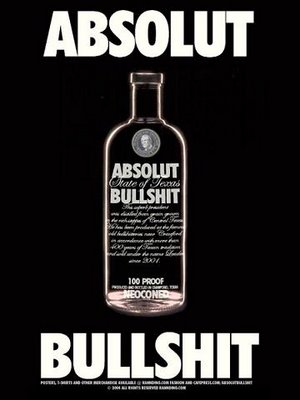 There’s lots of this stuff in The Game Changers.
There’s lots of this stuff in The Game Changers.
Folks, I’m almost done with this garbagefest of a movie, but before I sign off there’s one more thing I’d like to address.
Sylvester “Sly” Stallone versus Arnold “Shleazebahll” Schwarzenegger
Arnold Schwarzenegger and James Cameron go way back – Cameron directed the Terminator movies that made the former bodybuilder one of the biggest names in Hollywood. Decades later, the two have again collaborated as executive producers of The Game Changers, with Schwarzenegger appearing repeatedly throughout the film. In March of this year, Schwarzenegger publicly announced he was “99% vegan” and that he had been living on a meat and dairy-free diet for the past three years.
As of this writing, the 99% vegan Arnold Schwarzenegger is 72 years old. The meat-eating Sylvester Stallone is 73. It is no secret both have used anabolic drugs.
Here are the most recent photos I could find of both of them that give a good indication of the kind of shape they’re now in:
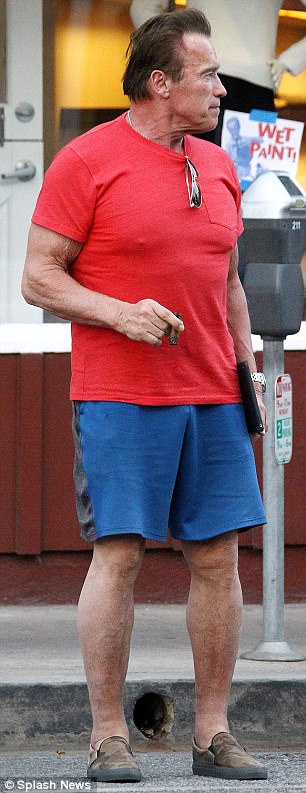 Arnold Schwarzenegger in 2018.
Arnold Schwarzenegger in 2018.
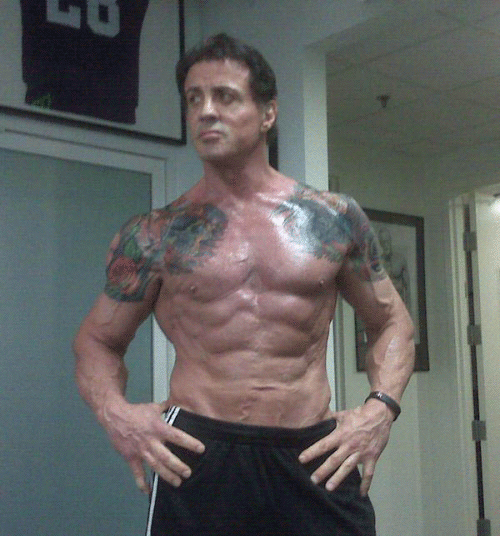 A much more aesthetically pleasing Sylvester Stallone in 2018, looking downright awesome for a 70 year old.
A much more aesthetically pleasing Sylvester Stallone in 2018, looking downright awesome for a 70 year old.
Say what you will of Stallone, but he definitely looks better than Schwarzenegger. Over the years, the two have had an unspoken and sometimes outspoken rivalry, but Sly…
You won.
As you might have surmised, I don’t like Schwarzenegger. The reason is simple: I think he’s a creep.
In 2003, the Los Angeles Times interviewed six women who alleged they had been groped and sexually harassed by Schwarzenegger. The women came into contact with him on movie sets, in studio offices and in other settings. One of the incidents occurred in the 1970s, two in the 1980s, two in the 1990s and one in 2000. At the time of that last incident, the famous actor would have been 52-53 years old - an age at which pleading immaturity or ignorance as to the effects of his behaviour would not only be untenable, but absurd.
One of the women, Anna Richardson, a British television presenter, went on to sue Schwarzenegger and his aides for libel when he claimed she’d encouraged his behaviour. In 2006, she settled out of court.
The LA Times allegations arose as Schwarzenegger made his run for the Governorship of California. Schwarzenegger’s campaign spokesman told the LA Times the aspiring politician had not engaged in improper conduct toward women. He said the allegations were simply part of an “escalating political attack” to diminish Schwarzenegger’s election hopes.
In 2018, however, Schwarzenegger admitted he "stepped over the line several times" when it came to sexual harassment, but claimed he was sorry. "When I became governor," claimed the actor, "I wanted to make sure that no one, including me, ever makes this mistake."
After becoming Governor, Schwarzenegger proceeded to show what a changed man he was by continuing to cheat on his then-wife, Maria Shriver. He even had an affair with their maid in the house they shared, fathering a love child.
Schwarzenegger again insisted he regretted his extramarital activity, but anyone who had followed the career of the “Austrian Oak” over the years knew this was just another case of Arnold being Arnold – a sociopathic, self-entitled narcissist who ruthlessly pursued his own interests at the expense of others.
Unlike fellow Hollywood identity Harvey Weinstein, Schwarzenegger has emerged relatively unscathed from the revelations about his past sexual harassment. Not everyone, however, has such a short memory. In December 2017, Schwarzenegger was scheduled to appear at an awards dinner for political “watchdog” organization Common Cause. The organization planned to present Schwarzenegger with a “We the People Award” for his work on gerrymandering reform. Some of We the People were disgusted, and a group of them began protesting and launched a petition urging Common Cause to rescind the honour, describing Schwarzenegger as a “serial harasser.”
“No one should attend this event unless Common Cause supports victims, not perpetrators, of sexual harassment by rescinding Arnold’s invitation,” the petition stated.
Common Cause rescinded the award, announcing in a public statement Schwarzenegger would not be attending the event and "We will not be giving an award to former Governor Schwarzenegger."
James Cameron clearly wasn’t deterred by his buddy’s misogynistic track record. A couple of years after this incident, he and his Terminator star were putting the finishing touches on yet another collaboration, in this case a bullshit-filled vegan ‘documentary’ heart-warmingly painting Schwarzenegger as a planet-conscious eco-warrior.
Schwarzenegger has no place pretending to be an environmentalist. Ever since the first Iraq war, he’s been driving around in one of those huge, fuel-guzzling pieces of shit known as a Hummer. Up until 2018, he was also getting around Hollywood and Beverly Hills in a Bugatti Veyron, the 8-litre supercar with a city-driving fuel consumption of 8 miles per gallon.
 Schwarzenegger's Bugatti Veyron.
Schwarzenegger's Bugatti Veyron.
Schwarzenegger, like many of his hypocritical celebrity peers, has jumped aboard the climate change bandwagon. A key facet of the anthropogenic global warming argument is that deforestation is increasing atmospheric CO2 levels and accelerating Planet Earth’s alleged spiral into a global sauna room. But while preaching his environmental gospel to We The Little People, the wealthy Schwarzenegger was building a sizable ownership in mega-billion dollar investment fund Dimensional Fund Advisors (DFA). In 2014, New Global Witness revealed DFA held shares totalling US $174 million in logging and palm oil companies, including firms implicated in highly destructive, and sometimes illegal, activities wiping out the rainforests of Borneo.
Schwarzenegger’s stock in DFA was listed in the highest category of ‘more than US $1 million’, and his annual dividends listed as ‘more than US $100,000’, also the highest category. Press reports indicated Schwarzenegger’s ownership in the company was estimated at 5%. This would mean the value of his stock and dividends are likely to be considerably higher than the minimum figures officially disclosed – which did not require his full stock value to be declared.
Schwarzenegger is just like Al Gore, another highly entrepreneurial Climate Hypocrite who sees fit to lecture us on the evils of our energy consumption while he himself lives large and guzzles energy like it’s 1999. In 2017, as he was gearing up to release the sequel to his fantasy blockbuster An Inconvenient Truth, the National Center for Public Policy Research revealed an inconvenient truth about Al Gore: His huge Tennessee mansion, housing just him and his partner, guzzled twenty-one times more energy than the average US home.
Al Gore: Preaching energy efficiency, while using 2,100% more electricity than you. And Arnold Schwarzenegger: Preaching to you about the environment, while driving around in 16-cylinder supercars and getting even richer thanks to deforestation. What an absolute load of bald-faced bullshit.
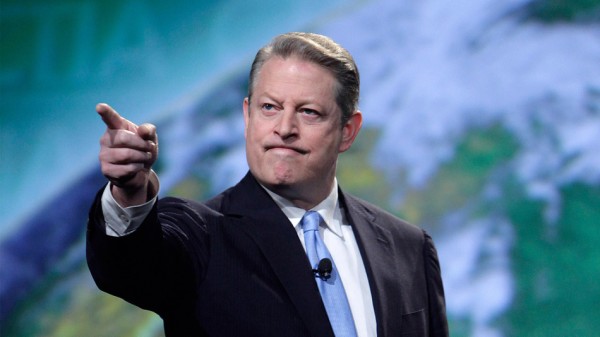 Al Gore: Yet another wealthy establishment hypocrite who lives by the "do as I say, not as I do" credo.
Al Gore: Yet another wealthy establishment hypocrite who lives by the "do as I say, not as I do" credo.
Other humanitarian, world-improving acts by Arnie the pseudo-environmentalist include slashing the prison sentence of convicted killer Esteban Nunez, son of former Assembly Speaker Fabian Nunez, who just happened to be a friend of Schwarzenegger. On his last day in office, Schwarzenegger commuted the killer's sixteen-year sentence to 7 years, and later acknowledged he had taken the action as a favour for his buddy Fabian. A Sacramento judge in September 2012 called Schwarzenegger's actions "distasteful" and "repugnant," but ruled the former governor had not exceeded his authority. The 2008 law allowing Schwarzenegger to pull off this shady favour requires victims to be notified before an event like a commutation. The victim's parents learned of the commutation when a reporter called them on New Year's Eve.
As a victim of the highly corrupt Australian legal system – which, as in the US, is a ‘common law’ system run by highly overpaid, coke-snorting, sexual degenerates – reading about this kind of corrupt, nepotistic behaviour truly infuriates me.
This is perhaps the penultimate insult of The Game Changers. Not only does it assault us with 1 hour and 25 minutes of highly misleading vegan bullshit while shamelessly claiming to be “Fueled by the Truth,” viewers are also expected to sit and admiringly watch a serial groper, philanderer, environmental hypocrite and perverter of the course of justice as he piously pontificates about diet, human health, media brainwashing and the environment!
Arnold, James, James and everyone else responsible for this disgraceful farce of a ‘documentary’ - you disgust me.
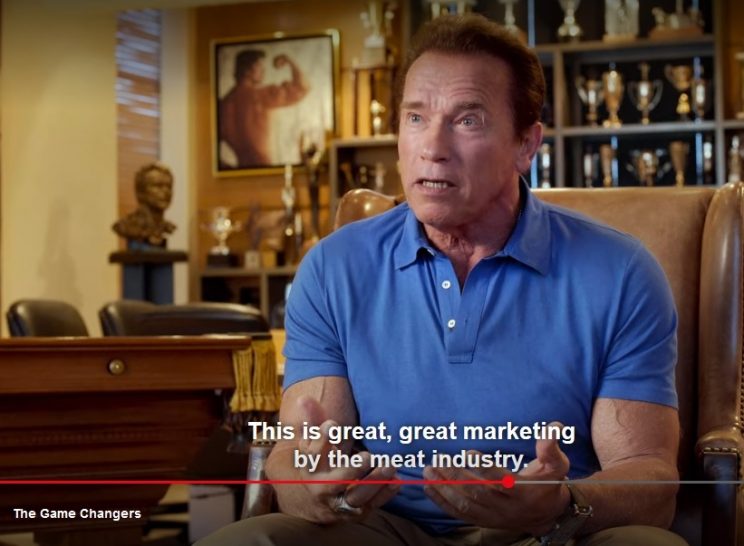 Yeah, and The Game Changers is shameless marketing by the vegan industry.
Yeah, and The Game Changers is shameless marketing by the vegan industry.
In Closing
A wise and manly man (and also champion meat-eating triathlete) once told me and my classmates that when you give a presentation or write an essay, you need to do three things: 1) Start by saying what you’re about to say, 2) say what you have to say, 3) finish by saying what you’ve just said.
So this is the part where I sum up and reiterate what I’ve said in Parts 1 and 2.
The Game Changers is an atrocious, patently dishonest farce designed to promote vegan ideology. It does so by combining dazzling Hollywood production with a non-stop assault of pseudoscience and egregious bullshit.
In addition to its duplicitous use of ‘science’, The Game Changers relies heavily on anecdote by parading a string of athletes who claim switching to a vegan diet kicked their strength and fitness into turbo boost. Each and every one of these athletes competes in sports notorious for anabolic drug use, and some of them even compete in organizations that, while paying lip service to ‘clean’ competition in their doping codes, don’t even bother to drug test. Yet we’re supposed to believe these athletes achieved physical greatness by eating soy protein and kale.
On top of all this, one of the executive producers has a long track record of misogyny and sexual harassment, slashed the prison sentence of a convicted killer as a favour to one of his politician friends, and is a blatant hypocrite when it comes to environmentalism. Yet he not only features in the credits, but is shown repeatedly throughout the film spouting his environmental and humanitarian ‘wisdom.’
The Game Changers is the biggest load of shit I’ve watched in a long, long time. Accept its contents at your peril.
Ciao,
Anthony.
If You Enjoyed this Article, Please Consider Sending a Tip
Folks, I sat through 1 hour and 25 minutes of this bollocks so that you didn't have to! Feel free to show some love and send a tip via Coinbase (cryptocurrency) or PayPal.
Donate with Crypto
- Campbell WW, et al. Effects of an omnivorous diet compared with a lactoovovegetarian diet on resistance-training-induced changes in body composition and skeletal muscle in older men. American Journal of Clinical Nutrition, Dec, 1999; 70 (6): 1032–1039. Free full text available: https://academic.oup.com/ajcn/article/70/6/1032/4729141
- Haub MD, et al. Effect of protein source on resistive-training-induced changes in body composition and muscle size in older men. American Journal of Clinical Nutrition, Sep, 2002; 76 (3): 511–517. https://academic.oup.com/ajcn/article/76/3/511/4677415?itm_medium=sidebar&itm_content=ajcn&itm_source=trendmd-widget&itm_campaign=trendmd-pilot
- Wells AM, et al. Comparisons of vegetarian and beef-containing diets on hematological indexes and iron stores during a period of resistive training in older men. Journal of the American Dietetic Association, May, 2003; 103 (5): 594–601. https://www.st-va.ncbi.nlm.nih.gov/pmc/articles/PMC2495081/pdf/nihms58552.pdf
- Raben A, et al. Serum sex hormones and endurance performance after a lacto-ovo vegetarian and a mixed diet. Medicine & Science in Sports & Exercise, Nov, 1992; 24 (11): 1290-1297. Free full text available: https://journals.lww.com/acsm-msse/pages/articleviewer.aspx?year=1992&issue=11000&article=00015&type=abstract (accessed 10 Apr 2020).
- Baguet A, et al. Effects of sprint training combined with vegetarian or mixed diet on muscle carnosine content and buffering capacity. European Journal of Applied Physiology, 2011; 111: 2571–2580.
- Hietavala EM, et al. Low-protein vegetarian diet does not have a short-term effect on blood acid–base status but raises oxygen consumption during submaximal cycling. Journal of the International Society of Sports Nutrition, 2012; 9: 50. Available: https://jissn.biomedcentral.com/track/pdf/10.1186/1550-2783-9-50
- Blancquaert L, et al. Changing to a vegetarian diet reduces the body creatine pool in omnivorous women, but appears not to affect carnitine and carnosine homeostasis: a randomised trial. British Journal of Nutrition, Apr, 2018; 119 (7): 759-770. Available: https://www.cambridge.org/core/services/aop-cambridge-core/content/view/F1B851C15DFA5F52D2033BA24A2BD70D/S000711451800017Xa.pdf/changing_to_a_vegetarian_diet_reduces_the_body_creatine_pool_in_omnivorous_women_but_appears_not_to_affect_carnitine_and_carnosine_homeostasis_a_randomised_trial.pdf
- Chang-Claude J, et al. Lifestyle Determinants and Mortality in German Vegetarians and Health-Conscious Persons: Results of a 21-Year Follow-up. Cancer Epidemiology, Biomarkers & Prevention, 2005; 14: 963-968. Available online (accessed Oct 7, 2014): http://cebp.aacrjournals.org/content/14/4/963.full.pdf
- Bae J-H, et al. Postprandial hypertriglyceridemia impairs endothelial function by enhanced oxidant stress. Atherosclerosis, 2001; 155 (2): 517–523.
- Marchesi S, et al. Impaired flow-mediated vasoactivity during post-prandial phase in young healthy men. Atherosclerosis, 2000; 153 (2): 397–402.
- Vogel RA, et al. Effect of a Single High-Fat Meal on Endothelial Function in Healthy Subjects. American Journal of Cardiology, 1997; 79 (3): 350–354.
- Li Z, et al. Hass avocado modulates postprandial vascular reactivity and postprandial inflammatory responses to a hamburger meal in healthy volunteers. Food & Function, Feb 26, 2013; 4 (3): 384-391. https://pubs.rsc.org/en/content/articlepdf/2013/fo/c2fo30226h
- Maruyama K, et al. Exposure to exogenous estrogen through intake of commercial milk produced from pregnant cows. Pediatrics International, 2010; 52(1): 33–38.
- Papacosta E, et al. Effects of acute postexercise chocolate milk consumption during intensive judo training on the recovery of salivary hormones, salivary SIgA, mood state, muscle soreness, and judo-related performance. Applied Physiology, Nutrition, and Metabolism, 2015; 40: 1116–1122.
- Howie BJ, et al. Dietary and hormonal interrelationships among vegetarian Seventh-Day Adventists and nonvegetarian men. American Journal of Clinical Nutrition, l985; 42: 127-134.
- Key TJA, et al. Testosterone, sex hormone-binding globulin, calculated free testosterone, and oestradiol in male vegans and omnivores. British Journal of Nutrition, 1990; 64: 111-119. https://www.cambridge.org/core/services/aop-cambridge-core/content/view/27DDFF5DF01A55EA4E1ECDBA443B7896/S0007114590000897a.pdf/testosterone_sex_hormonebinding_globulin_calculated_free_testosterone_and_oestradiol_in_male_vegans_and_omnivores.pdf
- Belanger A, et al. Influence of Diet On Plasma Steroid And Sex Plasma Binding Globulin Levels In Adult Men. Journal of Steroid Biochemistry, 1989; 32 (6): 829-883.
- Tanaka M, et al. Isoflavone supplements stimulated the production of serum equol and decreased the serum dihydrotestosterone levels in healthy male volunteers. Prostate Cancer Prostatic Dis 2009; 12: 247–52. https://www.ncbi.nlm.nih.gov/pmc/articles/PMC2834330/pdf/pcan200910a.pdf
- Hamilton-Reeves JM, et al. Isoflavone-rich soy protein isolate suppresses androgen receptor expression without altering estrogen receptor-beta expression or serum hormonal profiles in men at high risk of prostate cancer. Journal of Nutrition, Jul, 2007; 137 (7): 1769-1775. https://academic.oup.com/jn/article/137/7/1769/4664529
- Dillingham BL, et al. Soy Protein Isolates of Varying Isoflavone Content Exert Minor Effects on Serum Reproductive Hormones in Healthy Young Men. Journal of Nutrition, Mar, 2005; 135 (3): 584–591. https://academic.oup.com/jn/article/135/3/584/4663709
- Gardner-Thorpe D, et al. Dietary supplements of soya flour lower serum testosterone concentrations and improve markers of oxidative stress in men. European Journal of Clinical Nutrition, 2003; 57: 100–106. https://www.nature.com/articles/1601495.pdf
- Habito RC, et al. Effects of replacing meat with soyabean in the diet on sex hormone concentrations in healthy adult males. British Journal of Nutrition, 2000; 84: 557–63. https://www.cambridge.org/core/services/aop-cambridge-core/content/view/50C464775151BA6ECBF767221F763AFF/S0007114500001872a.pdf/effects_of_replacing_meat_with_soyabean_in_the_diet_on_sex_hormone_concentrations_in_healthy_adult_males.pdf
- Mitchell JH, et al. Effect of a phytoestrogen food supplement on reproductive health in normal males. Clinical Science, 2001; 100: 613–618. https://pdfs.semanticscholar.org/d2d1/9429dbfd13a7114a2ce1c16754674849102b.pdf
- Haun CT, et al. Soy protein supplementation is not androgenic or estrogenic in college-aged men when combined with resistance exercise training. Scientific Reports, 2018; 8: 11151 | DOI:10.1038/s41598-018-29591-4. https://www.nature.com/articles/s41598-018-29591-4.pdf
- Goldin BR, et al. Hormonal response to diets high in soy or animal protein without and with isoflavones in moderately hypercholesterolemic subjects. Nutrition and Cancer, 2005; 51: 1–6.
- Nagata C, et al. Effect of soymilk consumption on serum estrogen and androgen concentrations in Japanese men. Cancer Epidemiology, Biomarkers & Prevention, 2001; 10: 179–184. https://cebp.aacrjournals.org/content/cebp/10/3/179.full.pdf
- Higashi K, et al. Effects of soy protein on levels of remnant-like particles cholesterol and vitamin E in healthy men. Journal of Nutritional Science and Vitaminology, Aug, 2001; 47 (4): 283-288.
*[Re vegetarian vs omnivore studies and ‘endurance’ performance] Actually, there was a fifth study which was, quite frankly, so bad I was initially going to ignore it – until I realized some vegan zealot would no doubt accuse me of ‘cherry-picking’ and seize upon the study as ‘proof’ a meat-free diet is better for athletic performance.
In reality, the study proved no such thing. It did not involve athletes or recreationally active subjects, but obese type 2 diabetics. It compared the effects of a vegetarian and a so-called “conventional diet” plus aerobic exercise in 74 patients with a mean age of 56 years. The “conventional” diet was in fact a “diabetic diet” administered according to the anti-saturate, cholesterol-phobic dietary guidelines of the Diabetes and Nutrition Study Group of the European Association for the Study of Diabetes. The two papers I found reporting the results of this study contained no detailed description of the prescribed diets and made no mention of meat, fish, eggs or dairy, except to state “Animal products were restricted to one portion of low-fat dairy a day” in the vegetarian group. So just what the “conventional diet” group ate remains something of a mystery.
At the end of this poorly-reported study, the vegetarian subjects allegedly experienced a slight increase in maximal performance, whereas no significant change was observed in the "conventional" diet group. VO2max also slightly increased in the vegetarian group (12%) but did not change significantly in the conventional group. Details on the testing procedures were virtually non-existent; it is standard procedure to discuss such methods in the methodology section of a published paper, but the Czech researchers responsible for this study didn’t even bother with a brief description of the testing procedures. There were a couple of throwaway mentions of Max Watt testing in the abstract and results section; this apparently was the measure of “maximal performance.” The only mention of VO2max measurement was a single blink-and-you-miss-it reference to spiroergometry in the abstract. Spiroergometry, for those of you who don’t recognize the term, is where subjects wear a face mask or mouthpiece and exercise while their cardiopulmonary response is measured.
As for why the vegetarian subjects might have experienced a greater improvement, the researchers did reveal that diet adherence was high among 55% of the vegetarian participants but only 32% of the “conventional diet” subjects. This raises questions about the palatability of the so-called “conventional” diet and whether an equal degree of support was given to the subjects by the Czech researchers, who have a long history of publishing pro-vegetarian papers. Further reading reveals that the vegetarian meals “were provided in two vegetarian restaurants” while “the conventional diabetic diet meals were provided at the Institute for Clinical and Experimental Medicine, Prague.” So the vegetarian subjects got to eat at restaurants throughout the study, while the poor bastards in the “conventional” diet group effectively received laboratory food.
Adherence to the exercise program was also greater in the vegetarian subjects compared to the conventional subjects (90.3% versus 80.6%, respectively). Again, this underscores the differences in compliance and further raises concerns about whether the two groups enjoyed the same degree of encouragement and support.
Head author of this terrible study was Hana Kahleova, who also happens to be the "Director of Clinical Residency" at the extremist vegan and animal rights outfit Physicians Committee for Responsible Medicine, a role for which she receives a handsome US $121,678 per year.
See:
Veleba J, et al. A Vegetarian vs. Conventional Hypocaloric Diet: The Effect on Physical Fitness in Response to Aerobic Exercise in Patients with Type 2 Diabetes. A Parallel Randomized Study. Nutrients, 2016; 8: 671. doi:10.3390/nu8110671. https://www.ncbi.nlm.nih.gov/pmc/articles/PMC5133059/pdf/nutrients-08-00671.pdf
Kahleova H, et al. Vegetarian diet improves insulin resistance and oxidative stress markers more than conventional diet in subjects with Type 2 diabetes. Diabetic Medicine, 2011, 28, 549–559. https://www.ncbi.nlm.nih.gov/pmc/articles/PMC3427880/pdf/dme0028-0549.pdf
---
The Mandatory “I Ain’t Your Mama, So Think For Yourself and Take Responsibility for Your Own Actions” Disclaimer: All content on this web site is provided for information and education purposes only. Individuals wishing to make changes to their dietary, lifestyle, exercise or medication regimens should do so in conjunction with a competent, knowledgeable and empathetic medical professional. Anyone who chooses to apply the information on this web site does so of their own volition and their own risk. The owner and contributors to this site accept no responsibility or liability whatsoever for any harm, real or imagined, from the use or dissemination of information contained on this site. If these conditions are not agreeable to the reader, he/she is advised to leave this site immediately.


